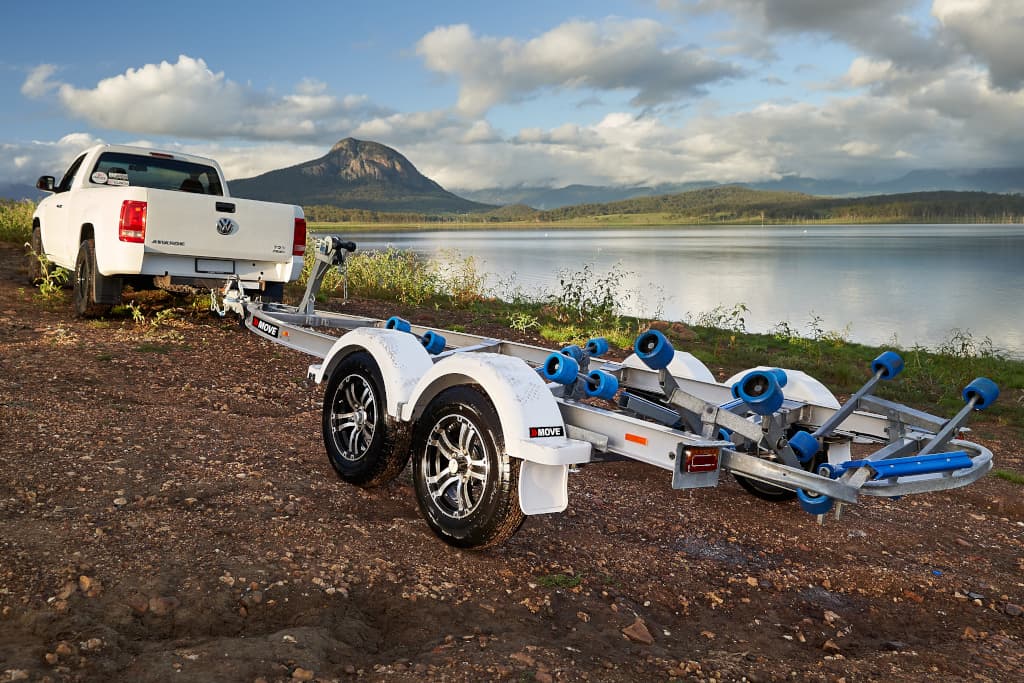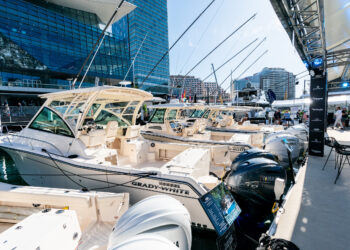
BOAT trailer maintenance is an important part of trailer care to extend its lifespan, below is a general checklist courtesy of Move Trailers to simplify the process and ensure safe towing on the road.
General Check
Whether you are towing short distances to the local ramp, trekking long distances along the highway or traversing across rugged dirt roads, any condition can take its toll.
Generally over time, trailer components wear. In turn, you will always want to give your boat trailer a good once-over before hitting the road, to avoid any unwanted surprises.
Some key areas to monitor and check their condition before, after, and even during a trip:
- Is the coupling fitting tight on the tow ball? Do you have an R-clip for the release handle?
- Are the tyres inflated and in good condition?
- Are the safety chains securely fastened?
- Are the skids and rollers adjusted to the right heights and in good working order?
- What condition are the suspension springs in?
- Are they cracked, corroded, or heavily rusted?
- Always inspect the frame for stress cracks, rusted fasteners, or loose nuts/bolts.
- Finally, are all your lights working, brake, indicator, and clearance lights.
General trailer checks mean safer travels. It also means you’re more aware of what’s going on with your trailer and to get issues resolved before they cause major damage.
The beauty of buying a new trailer is that you know it is in prime shape from the get-go and the above checks will simply keep your trailer in a good condition to ensure the longest lifespan possible.
Maintenance Points
1. Brakes – The braking system on your trailer is a disc brake system, either a mechanical override (cable operated) or hydraulic (fluid operated) braking system.
- Hydraulic callipers should be sprayed with an anti-corrosion spray after each use and serviced every 6 – 12 months. For trailers fitted with hydraulic braking systems, these should be covered when stored for long periods of time to protect against the elements, they are not waterproof, never directly hose or high-pressure clean the system. It is good practice to change the hydraulic oil in the system every 12-18 months, subject to usage, as condensation can mix with the hydraulic oil.
- The mechanical callipers and components are fully galvanized using stainless steel bushes and bolts. This braking system is easy to maintain and providing you wash your callipers, discs, and cables straight after use, either at the boat ramp or at home, will require minimal servicing. Mechanical brake cables generally last some time, however when you see signs of deterioration, the cable needs to be replaced. The cable can be adjusted. Hydraulic brake systems require a higher level of maintenance than mechanical override systems. Although hydraulic brake lines are coated, the joiners and hose fittings need to be regularly sprayed with a protectant. The callipers and pads will require yearly servicing.
2. Inspect/Replace Wheel Bearings – Your boat trailer’s wheel bearings should be serviced and resealed/repacked every 6 months depending on use. Trailer bearings allow the wheel to spin with minimum friction under a constant supply of grease. Without grease (which should be marine grade), the bearings will generate excessive heat, which will burn out and damage the bearings, wheels and even axles. Replace your wheel bearings when:
- Grease forms around the wheel hub’s exterior. This means grease that once lubricated the bearings has seeped out through the seals and needs to be re-placed.
- You hear squeaking or grinding noises while the wheels rotate.
- The wheel doesn’t spin freely (or there’s some resistance).
3. Manual Winches – The winch fitted on your trailer is of high quality, they are particularly chosen for that trailer load capacity. Do not overload your winch, use it only for the application it has been supplied for on normal ramp conditions. Webbing strap winch material is designed for higher load rating and braking strain, compared to cable equivalent. When you finish with the trailer for the day check that the winch strap is dry, if it is still wet unwind the strap off the winch and let it dry out. This will avoid rusting on the winch drum. Oil the winch shafts and gears monthly or when needed, subject to use.
4. Trailer Tyres Condition and Age – There are many types of trailer tyres on the market, the more common being light truck tyres. It’s always important to do the following:
- Avoid letting tyres sit on the bare ground when not in use to prevent flat spotting. Lay a sheet of plywood underneath the tyres or park the trailer on hard standing.
- Check the tyre walls regularly for wear and tear.
- Check for tread depth. Most tyres have wear markers, if the tread is close or past the wear markers the tyre tread is worn, and the tyre needs to be replaced.
- Manufacturers recommend replacing tyres 10 years after the manufacture date printed on them, regardless of appearance, mileage, or actual wear. However, most tyres will need replacing before they reach the 10-year mark.
5. Tyres Inflated – Trailer tyres are the unsung heroes of towing and shouldn’t be ignored. A tyre blow-out, worn-out bearings and improper tyre pressures all mean trouble. As with any road vehicle, proper tyre inflation is essential. What are signs that tyre inflation is too low or too high?
- Signs of low pressure (after long periods) includes wear on the inside and outside edges of the tyre.
- Signs of over inflation are the opposite, the tyre will have wear on the centre of the tread.
To correct both instances, simply follow the manufacturer’s recommended suggested pressure rating. Most trailers have a Vin/identification plate indicating the correct tyre size for the trailer and recommended pressure. If not, most tyres indicate this on the sidewall of the tyre. You should check the tyres before, during and after every trip. If the pressure is low, take a few minutes to inflate the tyre to the manufacturer’s rating.
6. Check the Lights and Electrical Connector – There are strict laws regarding trailer lights. Each state has its own legislation but are governed by the Department of Infrastructure. Regardless of the State or territory you are in, you need them. Boat trailers are required to have stop lights, taillights, indicators, clearance lights and reflectors. Many trailers have the wiring for lights running through the trailer frame, yet for wires that are not, they should always be securely tied down. While checking your trailer lights, wiring and electrical connector also double-check for:
- Burnt-out bulbs on older style light clusters that need replacement.
- Damaged wires or connectors.
- Cracked or loose lenses.
- A functioning fuse.
- Electricity runs from your tow vehicle to the trailer meaning that when the fuse fails, so do your trailer lights.
- Electrical connector intact and pins are not corroded.
7. Axles and Springs – Move Trailers recommends that trailer suspension components are inspected twice yearly, subject to use, for any evidence of loose mounting bolts, U bolts, corrosion, or broken leaf springs. Where Rocker Roller suspension is fitted, keep moving parts filled with grease at the grease points fitted. Painted suspension components should be sprayed regularly with anti-corrosion spray protectants to increase the life of the axles, springs, and hubs. Galvanized suspension requires a similar inspection and spraying with the same products, this will add to the life of the components.
8. Couplings – Connect the coupling to the tow ball on your car, if the coupling handle does not bottom out, check that the tow ball pressure bolt on the front of the coupling is not screwed too far in and stopping the coupling from going completely down over the ball. Mechanical, hydraulic, and standard couplings need to be greased every six months or when there is no grease present on the shafts, at the same time all the bolts and nuts need to be checked for tightness.
9. Wash down with fresh Water – Whenever you take your boat into a marine environment, you must remember that salt water corrodes. A wash down with fresh water is even important for aluminium and alloy trailers. Although aluminium and alloy doesn’t corrode in the same way as steel, there may still be steel components on the trailer. Without a good wash down, those components can quickly fall victim to rust.
10. Rollers and Skids – Check your boat trailer rollers and skids, brackets, bolts, nuts and split pins for cracking or breaks. It is important that your rollers are spinning freely and are clean of any grease or product that may be stuck between the spindles and rollers. Skids should be in good condition with no cracks or damage. Clean working rollers and skids will allow for a quick and easy launch and retrieval, making sure rollers and skids are adjusted to the correct height to support the boat as required.
Over time, boat trailer maintenance will become almost second nature and recognising repairs – before they happen – will result in more enjoyable experiences on the road, as well as at your destination.
Regular servicing with an expert will simplify the process to keep your trailer in tip-top shape. In a nutshell, the following trailer parts should be serviced as outlined:
1. Brakes:
a. Spray hydraulic callipers after every use.
b. Change hydraulic oil on relevant trailers every 12-18 months.
c. Service brakes every 6-12 months.
2. Wheel bearings:
a. Service every 6-12 months.
3. Manual winches:
a. Ensure winch straps are dry before winding them in and storing for lengthy periods.
4. Trailer tyres age:
a. Prevent sitting on solid ground for extended periods.
b. Check tyre condition before, after and during every use.
c. Replace when due – ensure it does not exceed manufacturers guidance.
5. Tyre inflation:
a. Follow manufacturers recommended tyre pressure
b. Check tyre condition before, during and after every use.
6. Lights & electrical connectors:
a. Check sound functioning before, during and after every use.
b. Replace as needed.
7. Axles & springs:
a. Subject to use, inspect twice yearly.
b. Spray painted/galvanised suspension units with anti-corrosion spray regularly
c. Keep moving parts filled with grease on Rocker Roller suspension
8. Couplings:
a. Check coupling connection before, during and after use.
b. Grease every six months or when no grease is present.
c. Check nutes and bolts for tightness before, during and after use.
9. Washing:
a. Wash down with fresh water after every use.
10. Rollers & skids:
a. Check before, during and after each use.
For more information on Move Trailers: moveboattrailers.com.au
















